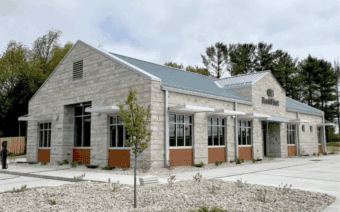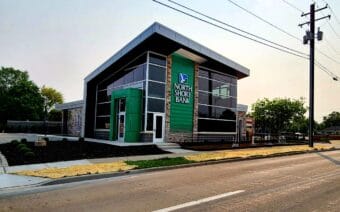
July 26, 2023
GREEN BAY – The Green Bay Packers – the National Football League’s (NFL) only publicly-owned team – reported a solid 2023 in terms of the team’s overall financials, which ran from April 2022 until March 2023.
“I’d say it was another strong financial year for the Packers – our second year of normal operations after the COVID-19 pandemic,” President/CEO Mark Murphy said.
The team reported a $68.6 million operating profit for the 2023 fiscal year.
Though drastically higher than the $38.8 million loss in the pandemic season of 2020, it’s 11.7% lower than the record-setting 2022 profit of $77.7 million.
The 2023 number is also slightly lower than the pre-pandemic profit following the 2019 season of $70.3 million.
More numbers
Murphy said the Packers saw a 7.8% boost in its national revenue – which is its share of the league and primarily encompasses the network television contracts – increasing from $347.3 million in 2022 to $374.4 million in 2023.
“The national revenue continues to grow, led by the TV broadcast contracts – those are built-in increases,” he said. “The ratings are very strong for the NFL. I think last year, 88 out of the top 100 broadcast shows were NFL games. This year we’re in right now will be the first year of the new TV deals.”

President/CEO Mark Murphy said the 2023 fiscal year – which ran from April 2022 until March 2023 – was the team’s second year of normal operations after the COVID-19 pandemic. Photo Courtesy of the Green Bay Packers
Murphy said the organization saw slower growth locally, partly because of its one less home game.
“Local revenue grew, but at a much slower rate than the national,” he said. “A couple of reasons for that. The main reason is because we played the London game – so, we had one home preseason game and then eight regular season games.”
Murphy said had it not been for the London game or the settlement payment, the team’s income statement would have been similar to 2022.
Murphy said to provide football with the resources they need in order to field competitive teams, “I tend to (highlight) two real keys for us in terms of being in sound financial position.”
“It’s a long-term collective bargaining agreement – we’re in the third year of a 10-year collective bargaining agreement,” he said. “It allows us to control costs in a way where we can anticipate (things). Back-to-back 10-year collective bargaining agreements have been great for the league, great for the game and great for the players as well.”
The second key to a sound financial position, Murphy said, is the long-term TV deals.

Mark Murphy
?
“I think the league has done a nice job, kind of planning for the future,” he said. “Sunday Ticket, which will start this year on YouTube TV replacing the DirectTV, and then the Thursday night package on Amazon was a smart move by the league. It gives us the traditional networks, as well as some streaming options.”
The team’s expenses saw an 8% increase from 2022 ($501.3 million) to 2023 ($541.6 million).
“Probably about half of it is player and team-related,” Murphy said. “And then we had a league-wide legal settlement. That was a one-time expense.”
The Packers reported an investment fund loss of $20.5 million.
“We’re no different than anybody else with 401k or Wall Street,” Murphy said. “Last year was a little bit of a bloom (a gain of $5 million), and this year was a little bit of a bust.”
That being said, Murphy said the organization’s corporate reserve fund is still at $474 million.
“It has been as high as $545 million,” he said. “We used to call it the Packers Preservation Fund, but it’s kind of our rainy day fund. We don’t have a deep-pocketed wealthy owner, so this is kind of our equivalent.”
Murphy said the Packers have continued to invest in Lambeau Field – “our most important asset.”
“Over the last two years, we will have invested around $200 million into the stadium,” he said. “That’s really for three different main expenses – a new football facility, new video boards and concourse renovations. We’ve been doing concourse renovations for the last three or four years.”

Mark Murphy said over the last two years, the Packers have invested around $200 million into the stadium, which includes renovating its traditional concession stands into grab-and-go options. Photo Courtesy of the Green Bay Packers
Aaron Popkey, director of public affairs with the Packers, said the organization renovated 10 traditional concession stands into grab-and-go options.
Since the redevelopment of Lambeau Field in 2003, Murphy said the Packers have invested $600 million into the stadium.
Murphy said the organization also continues to invest in the community.
“This year, our charitable impact in terms of the community was just under $10 million,” he said. “We continue to contribute to our foundation, as well. This year, we made a $5 million contribution and the endowment now is at $50 million.”
Murphy said the Packers have also continued to invest in Titletown – the real estate development adjacent to Lambeau Field.
“Over the five years, all the parties (involved) – we work with a variety of partners – we’ve invested more than $300 million into Titletown,” he said. “We think having Titletown was instrumental in securing the 2025 NFL Draft.”
The team reported a net income of $35.6 million, which is a reflection of the operating profit plus or minus investment performance and tax liabilities.
It is a 42.2% decrease from 2022 ($61.6 million).
The Packers are the only NFL team required to release its financial data because it’s a publicly-owned team.
The team invited its more than 539,000 shareholders to its annual shareholders meeting at Lambeau Field July 24 – just days before the Packers took to the practice field for training camp.
“(We had) several thousand of our owners on hand to see the new stadium pieces, including the video boards,” Popkey said.
 AWI prepares welders for workforce – and the world
AWI prepares welders for workforce – and the world Getting modern tools into the hands of today’s learners
Getting modern tools into the hands of today’s learners








